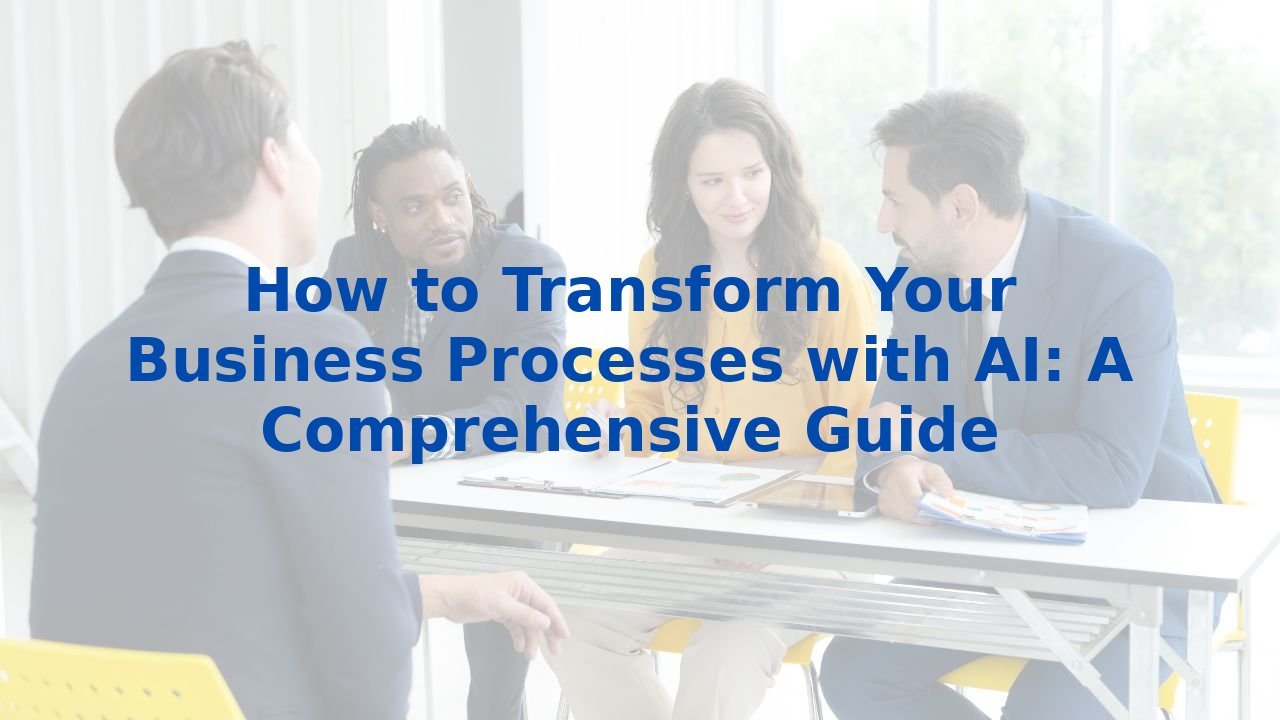How to Transform Your Business Processes with AI: A Comprehensive Guide
How to Transform Your Business Processes with AI: A Comprehensive Guide
In today's rapidly evolving business landscape, the integration of artificial intelligence (AI) into business process management (BPM) stands out as a game-changer. As organizations seek efficiency and sustainability, harnessing the power of AI can unlock new potential and redefine how enterprises operate. This guide will delve into the transformative potential of AI, focusing on its ability to enhance various business processes and the significant benefits of equipping your workforce for these changes.
Understanding AI in Business Processes
At its core, AI in BPM involves the application of machine learning, natural language processing, and data analysis to build, assess, and refine efficiencies in workflows. The key here is not just about replacing human effort but augmenting it. Embracing AI allows businesses to explore uncharted territories of productivity, turning mundane tasks into streamlined operations that free up valuable human resources for strategic initiatives.
Enhancing Efficiency with AI
Automating Repetitive Tasks
One of the most immediate impacts of AI is its ability to automate routine tasks—everything from data entry to scheduling can be efficiently handled. This frees your team to concentrate on creative and strategic responsibilities, enabling them to add more value to the organization.
Informing and Speeding Up Decision-Making
AI excels at analyzing vast amounts of data to uncover trends and patterns. By leveraging AI, businesses can transition from reactive to proactive decision-making—anticipating market trends and customer needs rather than merely responding to them. Imagine making decisions based on predictive insights rather than just instinct. This shift is the cornerstone of strategic growth.
Optimizing Resource Allocation
Understanding when and where to allocate resources can significantly impact a company's bottom line. With AI-driven analysis, businesses can optimize inventory management and labor allocation, ensuring that resources are used effectively, thereby minimizing waste and maximizing profitability.
Speeding Up Planning and Research
NLP capabilities allow AI to distill vast amounts of information into concise summaries. This accelerates research and planning phases; whether it's preparing reports or collating feedback, AI can streamline communications and save time.
Mitigating Risks
Utilizing predictive analytics empowers organizations to forecast potential risks and develop strategies to mitigate them. AI can highlight vulnerabilities before they escalate, positioning your business to act preemptively rather than reactively. This shift from remediation to prevention enhances the sustainability of operations.
Transforming Business Processes with AI
Process Discovery and Mapping
AI technologies can mine existing processes to expose inefficiencies that may not be evident to the human eye. Through process mapping, AI systematically identifies areas ripe for enhancement—shedding light on bottlenecks and redundancy that can be eradicated.
Process Automation
Through intelligent software robots, AI can automate entire workflows, cutting down on the time and effort needed for tasks like invoice processing or employee onboarding. This not only increases speed but also reduces the errors traditionally associated with manual handling of such processes.
Continuous Process Management and Improvement
With continuous monitoring capabilities, AI can provide real-time feedback on workflows, allowing businesses to adjust dynamically and address problems as they arise. This ongoing adaptability ensures that processes remain effective and relevant as market conditions evolve.
The Crucial Role of Employee Training
As powerful as AI technologies are, they require an equally robust foundation of human expertise. Training your employees on the nuances of AI fosters a culture of innovation and flexibility within your organization. Here are some key benefits:
1. Enhanced Decision-Making
Trained employees can interpret AI-generated insights effectively, empowering them to make informed, data-backed decisions.
2. Improved Efficiency
Understanding how to leverage AI tools allows employees to automate relevant tasks, enabling higher productivity and greater workplace satisfaction.
3. Seamless Integration
Fostering familiarity with AI tools ensures that the transition to AI-enhanced processes is smooth, minimizing disruptions in daily operations.
4. Adaptability
An AI-trained workforce can rapidly acclimate to evolving technologies, preparing the organization to meet future challenges head-on.
Conclusion
The transformative journey of integrating AI into business processes offers a pathway to operational excellence and strategic foresight. By automating mundane tasks, enhancing decision-making, and optimizing resources, AI stands to redefine performance metrics within organizations. Pair this technological advancement with comprehensive employee training, and you cultivate an environment primed for success. Embrace this opportunity to innovate, adapt, and lead in the evolving landscape of business. The future is bright, and with AI at your side, it’s yours to shape.



